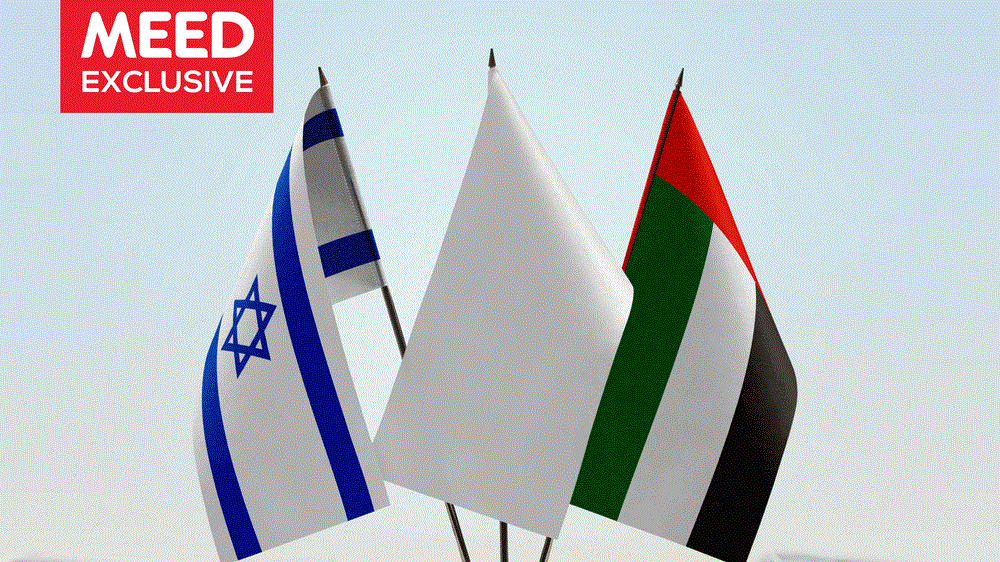

 Commentary
Commentary
Richard Thompson
MEED's editorial director
On 13 August 2020, Abu Dhabi announced the normalisation of relations with Israel in return for Tel Aviv suspending declarations of sovereignty over Palestinian areas outlined in US President Donald Trump’s Vision for Peace presented in January this year.
Israel is officially recognised as a sovereign state by the UAE.
Symbolically, it is a historic moment. Until now, Jordan and Egypt were the only Arab countries to accept Israel’s right to exist. All other Arab states refused to officially acknowledge Israel. There were no diplomatic connections, no direct flights, no trade links.
In reality, however, the announcement was inevitable. It was a question of timing. For the UAE, that time is now.
It is the next step of a reality that has been building for many years. And it is official confirmation that, for the leaders of many Arab states today, the Arab Israeli conflict is no longer the central issue defining Middle East politics.
As the US continues its disengagement from the region, stability and security has prioritised close cooperation between the Gulf states and Israel, who are united by fear of the common enemy in Tehran.
The deal is not simply about politics and military security. It is also about long-term economic and political sustainability in a post-US, post-oil Middle East
For many Palestinians it is a heartbreaking moment.
While the agreement suspends Israel’s sovereignty claims and further annexation of Palestinian territory, it promises little more than ‘future dialogue’ on Palestinian statehood and their rights in their own land.
And it confirms that Palestinians have become little more than observers in Palestine. Palestinian leaders have described it as a betrayal.
Other critics of the agreement, which was announced in a joint statement after talks between Abu Dhabi Crown Prince and Deputy Supreme Commander of the UAE Armed Forces Mohamed bin Zayed al-Nahyan, US President Trump and Israeli Prime Minister Benjamin Netanyahu, say that it is little more than a marketing stunt by Trump and Netanyahu in the run up to difficult elections.
For the UAE, it is a significant statement of its agenda, of where it sees its place in the world.
Abu Dhabi knows that many people across the region – the proverbial Arab man in the street – and around the world will disapprove of its actions. Previously, this would have been decisive in preventing such a deal.
The agreement highlights that in an increasingly unstable, uncertain world, the UAE is prioritising a forward-looking agenda of achieving its vision of where it wants to be, over a historical view of what others say that it is supposed to be.
Some will say that this is a triumph of ambition over ideals. But the deal is not simply about politics and military security. It is also about long-term economic and political sustainability in a post-US, post-oil Middle East.
And for the UAE, it is about leading the region into that new reality.
Enabling Palestinian businesses to be at the forefront of these opportunities should be made a priority
As well as announcing the full normalisation of relations between the UAE and Israel, the agreement promises cooperation between the region’s two most advanced economies across a wide range of economic areas including investment, tourism, direct flights and security.
For business in the UAE, a major new market has just opened up. There is no doubt there will be commercial opportunities for many establishment entities. Enabling Palestinian businesses to be at the forefront of these opportunities should be made a priority.
Despite this, the UAE faces significant political risks from the agreement.
It is not the comprehensive peace deal claimed by Trump. Israel is being rewarded for suspending the ilIegal annexation of Palestinian territory. And ‘suspension’ does not mean ending. How long can Tel Aviv be relied on to honour the agreement? And what happens if it reneges?
You might also like...

Egypt strengthens its economic position
04 March 2026

Kezad signs land lease deal with Galadari Brothers
04 March 2026
A MEED Subscription...
Subscribe or upgrade your current MEED.com package to support your strategic planning with the MENA region’s best source of business information. Proceed to our online shop below to find out more about the features in each package.
Take advantage of our introductory offers below for new subscribers and purchase your access today! If you are an existing client, please reach out to your account manager.











